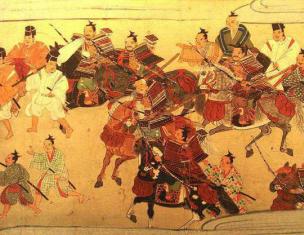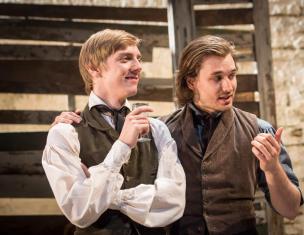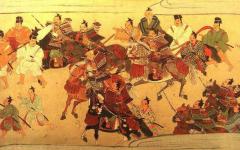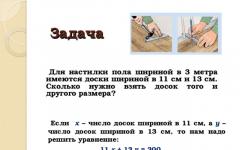Nikolay Schilder
In 1897-1898, a four-volume history of the reign of Alexander I was published in St. Petersburg and immediately received the highest praise from readers and critics. Contemporaries noted the inherent ease and excitement in the presentation of materials in this monumental work, the accuracy and psychologism of historical portraits, the wealth of printed sources used and newly published archival materials, and their scrupulous analysis. The author of the study was N.K. Schilder - military man, courtier, scientist...
Nikolai Karlovich was born into the family of engineer-general Karl Andreevich Schilder. His early interest in history was awakened in him by the stories of his father, who received a baptism of fire at Austerlitz, and in 1812 defended Bobruisk, besieged by Napoleonic troops. K. A. Schilder died on June 11 (23), 1854 from a serious wound from a fragment of a Turkish grenade. Three weeks earlier, his son Nikolai turned twelve years old.
N. K. Schilder was brought up in the Page Corps, from which he was released in 1860 as a lieutenant officer in the Life Guards Preobrazhensky Regiment with secondment to Nikolaevskaya engineering academy. After taking a course at the academy, he transferred to the Life Guards Sapper Battalion, which his father once commanded. He served as an adjutant to the outstanding military engineer General E.I. Totleben (1818-1884). In 1874 he was promoted to adjutant wing. He took part in the war with Turkey of 1877-1878, including the storming of Plevna, for which he received a golden weapon, the Order of St. Anne, 2nd degree with swords and rank major general with appointment to His Majesty's retinue. In 1879 he headed the Gatchina Nikolaev Orphan Institute. In 1886, he was promoted to lieutenant general and appointed director of the Nikolaev Engineering Academy. In 1899, after the death of A.F. Bychkov, he received the position of director of the Imperial Public Library.
Since 1872, Schilder actively collaborated in scientific periodicals, such as “Russian Antiquity” and “Historical Bulletin”, publishing their historical research there. Many of them belonged to the era of the reign of Alexander I: “Count Arakcheev in 1812-1834” (1882), “Russia and its attitude towards Europe during the reign of Alexander I in 1806-1815” (1888-1890), “Kutuzov in 1812" (1894), "Tagan-rog in 1825" (1897), "Interregnum in Russia in 1825" (1897). In 1886-1888, Schilder’s first extensive work appeared: “Count E.I. Totleben. His life and work. Biographical sketch" (in 2 volumes). The next was a four-volume study “Emperor Alexander I, his life and reign.” This was followed by the six-hundred-page “Emperor Paul I” (1901). IN recent years life, Schilder began studying materials about Nicholas I. Two volumes dedicated to Nicholas’s reign were published in 1903, shortly after the historian’s unexpected death. However, his most significant and most famous work remains the biography of Alexander I.
To describe Alexander's reign, Nikolai Karlovich developed a periodization, which many historians still adhere to. He suggested: “For the most convenient overview of the events of the reign of Emperor Alexander, we can divide his state activity into three periods. The first period covers the time from 1801 to 1810. It is usually given the name of the era of transformation. Delving deeper into the spirit of this period, it would be more accurate to call it an era of oscillations... The second period lasts from 1810 to 1816 and, in its internal meaning, is entirely focused on the fight against France. This period, in contrast to the previous one, personifies the persistent pursuit of one dominant thought, brought to the end with remarkable consistency - an example that is perhaps the only one in the entire reign of Alexander I. Unexpectedly for everyone, to the surprise of the whole world, he showed himself unshakable in 1812... Meanwhile, Napoleon, preparing for the invasion of Russia, based his political and military calculations on the imaginary weakness of Alexander... Alexander's thought, which he then steadily pursued, was the overthrow of Napoleon. “Napoleon or I, me or him, but together we cannot reign,” said Alexander at the very height of the war with his brilliant rival and remained true to this thought until its complete implementation, even amid all the adversities that accompanied this struggle, unprecedented in the annals of the world. The third period, beginning in 1816, ends with the death of Emperor Alexander in 1825. Historians usually assign to this period the name of the period of congresses and the preservation of the order established by them in Europe. It would be more correct and closer to the truth to call this last decade a period of reaction.”
Most of the second and the entire third volume of the edition is devoted to the confrontation between Alexander and Napoleon, full of internal tension and external collisions. A deep personal, dynastic and ideological conflict between the two most powerful people of their time; the changeable happiness that accompanied first one and then the other on the battlefields; their fragile and short-lived union; finally, the decisive battle between them - this now textbook plot of historical drama was described, documented and analyzed by Schilder with an accuracy and thoroughness that no Russian historian had been able to achieve before him. Thanks to this, Schilder’s work still remains exemplary and unsurpassed in many respects. Without references to it, no study of the Alexander era is possible.
A well-educated military engineer with combat experience, Schilder was able to skillfully reconstruct the events that took place on the battlefield. Probably one of the most difficult pages for him, a professional military historian, were the pages devoted to the defeat of the Russian army at Austerlitz on November 20 (December 2), 1805. But he tried to solve this problem with maximum tact. Remembering that he was writing the history of Alexander I - the emperor, commander and man, Schilder concentrated not so much on the movements of troops and the course of the battle, but on the actions and experiences of his hero: “The morning of November 20th (December 2nd) came, so impatiently expected by the allies confident of victory. When the performance began, a thick fog covered the area. Even before sunrise, Emperor Alexander, accompanied by Kutuzov, drove up to the bivouac of General Berg’s brigade. They got off their horses and warmed themselves by the fire. “Are your guns loaded?” - the sovereign asked Berg. When General Berg replied that no, the sovereign ordered the guns to be loaded. From these words, General Berg learned for the first time what was going to happen that day. General Berg was also a witness to the following remarkable conversation between Emperor Alexander and Kutuzov, which sheds bright light on the impossible circumstances in which the “strange event” of November 20 took place. When Emperor Alexander mounted his horse again, he asked Kutuzov: “Well, do you think things will go well?” The old commander, but at the same time a clever courtier, smiling, replied: “Who can doubt the victory under the leadership of Your Majesty?” The emperor objected: “No, you are in command here, I am only a spectator.” Kutuzov responded to these words with a bow. When the sovereign retreated somewhat, Kutuzov turned to General Berg and told him in German: “That’s wonderful! I must command here, although I did not order this attack, and I did not want to undertake it at all.” Hearing this, General Berg moved with his troops with a gloomy foreboding of the hardships ahead of us... Kutuzov, truly appreciating the significance of the Pratsen Heights, reluctantly left them and, under various pretexts, delayed the movement. Napoleon did not allow the allies to calmly carry out their plan. He occupied the Pratsen Heights and, thus breaking through the center allied forces, thereby putting his opponents in a defensive position, involving them in a random battle with all the chaos inherent in it... “Everyone realized the need to recapture the heights at any cost. Everyone strived for this goal, but the troops were in an inconvenient order for battle (marching). There was no general plan and general leadership from above. The consequence of this was a stubborn, desperate two-hour battle (from nine to eleven o'clock), consisting of a series of brilliant private attacks without intercom between themselves and ended in the defeat of the center” (General Leer. War of 1805. Austerlitz operation. St. Petersburg, 1888). The words spoken by Napoleon the day before came true Battle of Austerlitz: “If the Russians leave the Pratsen Heights, then they will perish irrevocably.” Having established himself on the Pratsen Heights and occupying them with strong artillery, Napoleon launched a decisive offensive against both flanks of the enemy, which finally decided the fate of the day. By evening, the allied army found itself on the road to Hungary, having lost up to 27,000 people (including 21,000 Russians) and 158 guns (of which 133 were Russian). Moreover, our army lost 30 banners. The loss of the French reached 12,000 people. Fortunately for the vanquished, the pursuit of the French was not as persistent as it could have been. Napoleon was proudly aware of the superiority of his orders at Auster-Litz. He said on this occasion: “J"ai livre trente batailles, mais je n"en ai vu aucune ov la victoire ait ete si decidee...” (I fought in thirty battles, but never saw one in which victory was so predetermined... - French). Alexander was not feeling well, but now he felt such a physical and moral disorder that he could not go further. He got off his horse, sat down under a tree on the ground, covered his face with a handkerchief and burst into tears. The sharp and sudden transition from recent victorious hopes to the stunning events that followed was, of course, very bitter.”
Admired by Schilder’s work, the literary scholar and historian Alexander Nikolaevich Pypin (1833-1904) wrote about the strong impression that his history of Alexander I made on his contemporaries: “It was a work not yet seen in our literature in this area. I was amazed by the wealth of material, some of it painstakingly collected from great literature Russian and foreign, but mainly extracted for the first time from archives, which, by the way, are not always accessible. The performance itself was amazing. The author not only collected facts, but depicted the characters he studied, firstly, with great psychological observation, and secondly, with full knowledge morals, customs and moods of the era. Finally, the presentation itself had remarkable merits: the book read like a novel - the best praise a reader could give to this light, lively story, where the author knew how to clearly highlight significant events and surround them with characteristic details, all the more curious because he always took special care of their accuracy. Biography is only part of the story, but it is clear that the biography of powerful state leaders is very close to his real history. N. K. Schilder always felt this, and his story acquired special impressiveness. But besides this purely historical idea, which is necessary for a broad and correct coverage of events in the life of the state, another idea or feeling was constantly hovering in the writer’s historical view: the idea of a higher moral law, which should become a criterion for the most historical assessment... His history of the imperial The work of Alexander I was a real feat in terms of the mass of processed literary and archival material, which he generally treated with the greatest attention and accurate criticism. Scientific merit was supplemented by literary merits rare in our historiography: lively, visual, elegant presentation, which made Schilder’s work an extremely important acquisition of literature.”
To narrow down the search results, you can refine your query by specifying the fields to search for. The list of fields is presented above. For example:
You can search in several fields at the same time:
Logical operators
The default operator is AND.
Operator AND means that the document must match all elements in the group:
research development
Operator OR means that the document must match one of the values in the group:
study OR development
Operator NOT excludes documents containing this element:
study NOT development
Search type
When writing a query, you can specify the method in which the phrase will be searched. Four methods are supported: search taking into account morphology, without morphology, prefix search, phrase search.
By default, the search is performed taking into account morphology.
To search without morphology, just put a “dollar” sign in front of the words in the phrase:
$ study $ development
To search for a prefix, you need to put an asterisk after the query:
study *
To search for a phrase, you need to enclose the query in double quotes:
" research and development "
Search by synonyms
To include synonyms of a word in the search results, you need to put a hash " #
" before a word or before an expression in parentheses.
When applied to one word, up to three synonyms will be found for it.
When applied to a parenthetical expression, a synonym will be added to each word if one is found.
Not compatible with morphology-free search, prefix search, or phrase search.
# study
Grouping
In order to group search phrases you need to use brackets. This allows you to control the Boolean logic of the request.
For example, you need to make a request: find documents whose author is Ivanov or Petrov, and the title contains the words research or development:
Approximate search words
For an approximate search you need to put a tilde " ~ " at the end of a word from a phrase. For example:
bromine ~
When searching, words such as "bromine", "rum", "industrial", etc. will be found.
You can additionally specify the maximum number of possible edits: 0, 1 or 2. For example:
bromine ~1
By default, 2 edits are allowed.
Proximity criterion
To search by proximity criterion, you need to put a tilde " ~ " at the end of the phrase. For example, to find documents with the words research and development within 2 words, use the following query:
" research development "~2
Relevance of expressions
To change the relevance of individual expressions in the search, use the " sign ^
" at the end of the expression, followed by the level of relevance of this expression in relation to the others.
The higher the level, the more relevant the expression is.
For example, in this expression, the word “research” is four times more relevant than the word “development”:
study ^4 development
By default, the level is 1. Valid values are a positive real number.
Search within an interval
To indicate the interval in which the value of a field should be located, you should indicate the boundary values in parentheses, separated by the operator TO.
Lexicographic sorting will be performed.
Such a query will return results with an author starting from Ivanov and ending with Petrov, but Ivanov and Petrov will not be included in the result.
To include a value in a range, use square brackets. To exclude a value, use curly braces.
Emperor Alexander I, his life and reign (1897). Volumes I-II NATURAL SCIENCES, CULTURE and ART Title: Emperor Alexander I, his life and reign (with 450 illustrations). Volumes I-II Author: Nikolai Shilder Publisher: St. Petersburg: Publishing House of A. S. Suvorin Year: 1897 (first edition) Pages: 238+434 Format: pdf (rar) Size: 84+104 MB Quality: good language: RussianBook about Alexander the Blessed, Emperor of All Russia. Unlike Peter I and his grandmother Catherine II, Russian Emperor Alexander I (1777-1825) was not awarded the prefix “great” by his descendants. And this happened not only because this title was already occupied by his Macedonian colleague and namesake... However, one cannot help but admit that Alexander I is one of the most striking and interesting personalities who occupied the Russian throne. During his reign, epoch-making events occurred in the history of our Fatherland. Like any person of historical significance, Alexander I had both major achievements and serious failures. In the first years of his reign, Alexander became famous for his wide social reforms, but it was during his reign that the Decembrist uprising was prepared. In 1805, Alexander and his allies were defeated by Napoleon at Austerlitz, but 9 years later he entered Paris at the head of Russian troops. It was under Alexander that the Russian people won great victory in the Patriotic War of 1812, but under him in Russian army A regime of gross arbitrariness and stick drill was established (the so-called Arakcheevism). As one of the leaders of the Congress of Vienna, Alexander sought to found a new European community based on religious and political principles, but very soon Russia began to be called the gendarme of Europe. Under Alexander, Masonic lodges gained enormous influence in Russia, but at the same time, the beginning of a grandiose flowering of national culture was laid. Alexander's death was shrouded in mystery. There was a legend that Alexander staged his own, but in fact lived for almost 40 years as a hermit in Siberia under the name of Fyodor Kuzmich. The author of the book is the famous Russian historian, Lieutenant General Nikolai Karlovich Schilder (1842-1902), who was rightfully considered “the best expert in scientific world of the era of Emperor Alexander I" and turned to him for historical consultations, including representatives royal family. The proposed study is based on a large amount of factual material and contains large number rare illustrations. This work is written easily and fascinatingly, its main advantages are a skillful psychological analysis, a thorough and accurate criticism of historiography and sources, an abundance of previously unknown materials on political, military, and diplomatic history, introduced into scientific circulation. The book deepens historical understanding and, by moving away from the one-sidedness of mere praise, opens up new perspectives. I am sure that it will help history buffs learn a lot of new and interesting things about the controversial and mysterious Russian Emperor, his life and his era. This work was published in 4 volumes, of which I can offer only three. Today presented: volume I, dedicated to the childhood and young years of Alexander before his accession to the throne, volume II, telling about the era of transformations from 1801 to 1810. A little later, volume IV will be published, dedicated to the last decade of the tsar’s life from 1816 to 1825, in which, in particular, the circumstances of the mysterious death of the emperor are examined in detail, as well as the results of his reign are summed up. Significant volume pdf files associated with a large amount of illustrative material. Recommended reading: Sovereigns from the House of Romanov 1613-1913K. V. Kudryashov. Alexander the First and the mystery of Fyodor KozmichRussia under the scepter of the Romanovs 1613-1913 A. N. Sakharov. Romanovs. Historical portraits0 1 2 3 4 5
With 450 illustrations.
Volume 1., 436 pp., illustrations in the text, 4 p. chromolithographs, 11 sheets. monochrome illustrations (1 sheet, double), 9 sheets. facsimile (1 sheet, double).
Volume 2., 408 pp., illustrations in the text, 3 p. chromolithographs, 9 sheets. monochrome illustrations (7 sheets of double), 10 sheets. facsimile.
Volume 3., 569 pp., illustrations in the text, 6 sheets. colored, 17 l. monochrome illustrations, 13 sheets. facsimile.
Volume 4., 651 pp., illustrations in the text, 10 sheets. colored, 5 l. monochrome illustrations, 10 sheets. facsimile. In 4 printed printed bindings of the steam workshop N.V. Gaevsky with gold stamping on the spine and silver on the front cover. English version with a golden head. The publisher's color chromolithographed covers have been preserved. A copy on special paper with a “big” crown on the spine! Torched edge. The endpapers are white moire paper. Chromolithographs and zincographs are lined with thin rice paper. Format: 30x22 cm. Price for “Alexandra” in pre-revolutionary Russia in bookseller catalogs it reached 150 rubles!

Bibliographic description:
1. Antiquarian book trade Solovyova N.V. Catalog No. 100, St. Petersburg, 1910, “Rare books.” Art, archeology, art publications, Rossica, books about Moscow and St. Petersburg. etc. Livres Rares, No. 307, 25 rubles!
2. Antique catalog of the Joint-Stock Island " International book" Leningrad. Collection of rare and valuable publications from the library of Maxim Ekimovich Sinitsyn. L., 1930, 28 pp., 8 sheets. ill. Choix de Beaux livres provenant de la bibliotheque de M. S... “Mejdounarodnaya book”, section des livres anciens, Leningrad, 1930, No. 51, 100 rubles!
3. Antiquarian book trade by P. Shibanov No. 149: Valuable books and autographs of remarkable persons. M, 1909, No. 734, 40 rubles!
4. N.B. “Russian book rarities”, vol.2. M., 1903, No. 348.
5. Burtsev A.E. “Detailed bibliographic description of rare and remarkable books”, St. Petersburg, 1901, vol. II, No. 523.
6. Ostroglazov V.M. (brother) “Rare and valuable publications”, “Russian Archive” for 1914, No. 9, p. 144. Rarity!
7. Bibliographic index of literature and recommended prices for the section “Russian History” of Mosbukkniga, No. 338, 750 rubles! With large crowns they even charged 1250 rubles!

And as an option - inexpensive publishing calico binding with gold embossing on the spines and binding covers, triple peacock feather edges, moire paper endpapers, silk ribbons; with the preservation of luxurious chromolithographed publishing covers with imperial crowns and emperor monograms:



 Alexander I Pavlovich the Blessed (12(23).12.1777, St. Petersburg, Winter Palace- 11/19 (12/01/1825, Taganrog) - Emperor of All Russia since 1801. The eldest son of Paul I Petrovich and His August Wife Maria Feodorovna (former Princess of Wirtemberg). The upbringing of Alexander I was led by Catherine II with the help and care of Generals Sophia Ivanovna Benkendorf and Praskovya Ivanovna Gessler, originally from England. Physical education Alexander Pavlovich was trained by Catherine II herself. The greatest influence on the young man was the Swiss F. Laharpe, an educator and moderate republican. La Harpe's teaching began with French. But on June 10, 1784, La Harpe presented Empress Catherine II with an extensive memo, like a pedagogical confession, in which he outlined what subjects and with the help of what aids he could and should teach the Grand Dukes Alexander and Constantine. After some time, he was appointed official Mentor. Catherine II’s concerns about Alexander’s upbringing were not limited to choosing mentors and composing the famous manual. She herself took up the pen to create a children's library useful for her grandchildren. Thus, “Grandma’s ABC” appeared, which compiled the library of the Grand Dukes Alexander and Konstantin Pavlovich. The ABC contains stories and conversations, proverbs and sayings, the tale of Prince Thebes; in addition, it occupies a prominent place in the presentation of the events of Russian history from the beginning Russian state before the first Tatar invasion of Rus' (from 862 to 1224). Intending her work for the edification of her grandchildren, the Empress presented the events in such a way that they would have a beneficial effect on the imagination of children and serve as examples for them. Catherine II forced her grandchildren to read the French Declaration of the Rights of Man and Citizen and herself explained its meaning to them. However, instead of faith and understanding of the main historical essence of his future reign, Alexander Pavlovich grows up to be a mystic, striving for abstract world problems. Despite an excellent selection of teachers and an extraordinary natural mind, Alexander I did not receive serious and deep knowledge due to laziness and dislike of learning. Since 1790, Catherine II was preoccupied with finding a suitable bride for Grand Duke Alexander Pavlovich. The studies ended on September 28, 1793, when Catherine II married her grandson to the Baden princess Louise Maria Augusta (in Orthodoxy Elizaveta Alekseevna). The future Sovereign of All Russia was then 15 years old. The need to maneuver between his father and grandmother, who hated each other, taught Alexander I to “live with two minds, keep two ceremonial faces” (Klyuchevsky). He became the heir Tsarevich on November 6, 1796. Knowing about Catherine II’s decision to transfer the throne not to Paul, but to him, Alexander I publicly declared that he did not want to reign and preferred to go abroad “as a private person, placing his happiness in the company of friends and in the study of nature.” When Paul became emperor, he appointed Alexander I military governor of St. Petersburg, chief of the Semenovsky Life Guards Regiment, inspector of cavalry and infantry, and later chairman of the military department of the Senate.
Alexander I Pavlovich the Blessed (12(23).12.1777, St. Petersburg, Winter Palace- 11/19 (12/01/1825, Taganrog) - Emperor of All Russia since 1801. The eldest son of Paul I Petrovich and His August Wife Maria Feodorovna (former Princess of Wirtemberg). The upbringing of Alexander I was led by Catherine II with the help and care of Generals Sophia Ivanovna Benkendorf and Praskovya Ivanovna Gessler, originally from England. Physical education Alexander Pavlovich was trained by Catherine II herself. The greatest influence on the young man was the Swiss F. Laharpe, an educator and moderate republican. La Harpe's teaching began with French. But on June 10, 1784, La Harpe presented Empress Catherine II with an extensive memo, like a pedagogical confession, in which he outlined what subjects and with the help of what aids he could and should teach the Grand Dukes Alexander and Constantine. After some time, he was appointed official Mentor. Catherine II’s concerns about Alexander’s upbringing were not limited to choosing mentors and composing the famous manual. She herself took up the pen to create a children's library useful for her grandchildren. Thus, “Grandma’s ABC” appeared, which compiled the library of the Grand Dukes Alexander and Konstantin Pavlovich. The ABC contains stories and conversations, proverbs and sayings, the tale of Prince Thebes; in addition, it occupies a prominent place in the presentation of the events of Russian history from the beginning Russian state before the first Tatar invasion of Rus' (from 862 to 1224). Intending her work for the edification of her grandchildren, the Empress presented the events in such a way that they would have a beneficial effect on the imagination of children and serve as examples for them. Catherine II forced her grandchildren to read the French Declaration of the Rights of Man and Citizen and herself explained its meaning to them. However, instead of faith and understanding of the main historical essence of his future reign, Alexander Pavlovich grows up to be a mystic, striving for abstract world problems. Despite an excellent selection of teachers and an extraordinary natural mind, Alexander I did not receive serious and deep knowledge due to laziness and dislike of learning. Since 1790, Catherine II was preoccupied with finding a suitable bride for Grand Duke Alexander Pavlovich. The studies ended on September 28, 1793, when Catherine II married her grandson to the Baden princess Louise Maria Augusta (in Orthodoxy Elizaveta Alekseevna). The future Sovereign of All Russia was then 15 years old. The need to maneuver between his father and grandmother, who hated each other, taught Alexander I to “live with two minds, keep two ceremonial faces” (Klyuchevsky). He became the heir Tsarevich on November 6, 1796. Knowing about Catherine II’s decision to transfer the throne not to Paul, but to him, Alexander I publicly declared that he did not want to reign and preferred to go abroad “as a private person, placing his happiness in the company of friends and in the study of nature.” When Paul became emperor, he appointed Alexander I military governor of St. Petersburg, chief of the Semenovsky Life Guards Regiment, inspector of cavalry and infantry, and later chairman of the military department of the Senate.


Fear of a tough and demanding father completed the formation of his character traits: “a real seducer” (M.M. Speransky), “a weak and crafty ruler” (A.S. Pushkin), “a sphinx not solved to the grave” (P.A. . Vyazemsky), “this is a true Byzantine... subtle, feigned, cunning” (Napoleon), “the crowned Hamlet, who was haunted all his life by the shadow of his murdered father” (A.I. Herzen). He agreed to palace coup, but knew nothing about the impending murder. The tragic death of his father made an indelible impression on him, and Alexander suffered all his life from the consciousness of his guilt in what happened. After the assassination of Paul I, in his manifesto, Alexander I announced that he would rule “according to the laws and according to the heart in the god of our late august grandmother.” He ascended the throne on March 12, 1801. Back in 1796, a circle of young aristocrats, the so-called, formed around Alexander I. The secret committee (A.A. Chartorysky, P.A. Stroganov, N.N. Novosiltsev, V.P. Kochubey), which considered it necessary to cancel serfdom and promote the creation of “lawfully free institutions.” According to the biographer of Alexander I, Grand Duke Nikolai Mikhailovich, Emperor Alexander I “was never a reformer, and in the first years of his reign he was more conservative than all the advisers around him.” But to consolidate power, “a wonderful beginning to the days of Alexander” was required. Alexander I abolished all the innovations of Paul I: he restored the “letters of letters” to the nobility and cities, freed the nobles and clergy from corporal punishment, declared an amnesty to all those who fled abroad, returned up to 12 thousand disgraced and repressed people from exile, abolished the Secret Expedition, which was engaged in the investigation and reprisal. After 1801, it was forbidden to print advertisements for the sale of serfs without land, but such sales were allowed. In 1803, a decree on free cultivators was issued, which allowed peasants to buy their freedom by agreement with the landowners. The deal was accompanied by such enslaving conditions that less than 0.5 percent of serfs took advantage of this right. However, for the first time in Russian history, the peasantry was recognized as having the legal right to own land, and landowners received grounds for freeing their serfs with land for ransom. The censorship statute of 1804 was the most liberal in the 19th century in Russia. In 1803 - 1804, a reform of public education was carried out: representatives of all classes could study, continuity was introduced curricula and new universities and privileged lyceums opened - Demidovsky (in Yaroslavl) and Tsarskoye Selo Metropolitan. The organs were transformed public administration. Through the efforts of M.M. Speransky's old Peter's collegiums were replaced by ministries. In 1811, a law strictly delineated the rights and responsibilities of the Senate, the Committee of Ministers and the State Council. New order public administration existed with minor changes until 1917. In 1805 - 1807, Alexander I took part in coalitions against Napoleon, was defeated at Austerlitz (1805) and was forced to conclude the extremely unpopular Peace of Tilsit in Russia (1807). But successful wars with Turkey (1806 - 1812) and Sweden (1808 - 1809) strengthened Russia's international position. Eastern Georgia (1801), Finland (1809), Bessarabia (1812) and Azerbaijan (1813), and the Duchy of Warsaw (1815) were annexed. Since 1810, the Russian army was being re-equipped and fortresses were being built, but when archaic system recruitment and serfdom could not be completed. Soon Napoleon decided to get rid of his too powerful neighbor and began to gather troops and build warehouses with the clear intention of attacking Russia. The invasion took place on June 12, 1812.



 At the beginning Patriotic War 1812 Alexander I, convinced of his inability to lead his troops, transferred command to Barclay de Tolly, and then to M.I. Kutuzov. Napoleon's 600,000-strong army had a thousand guns, and by this time Russia was able to assemble three different armies only 205 thousand people with 640 guns. Retreating before the enemy, the Russian army gradually accumulated forces coming from distant provinces, and Napoleon's army, forced to guard its lines of communication, decreased. As a result, when the Battle of Borodino took place on August 26 of the same year, 120 thousand Russian troops took part in it against 125 thousand French. The total number of soldiers killed and wounded in this battle was 110 thousand. At the beginning of September, the French entered Moscow, and in October they were forced to begin a retreat. Only 20 thousand people who had one gun crossed back to the Russian border. The military successes of the Russian army made Alexander I the arbiter of the destinies of Europe, and in 1813-1814 Alexander I led the anti-French coalition and entered Paris at the head allied armies. This happened on March 19, 1814, and our troops stayed in France and Germany until 1817. These military events extremely raised the patriotic spirit of the Russian people and caused new activity all the healthy forces of the country and weakened the craze Western Europe among the upper class of society, but this evil was still very far from being completely eradicated. In 1815, Emperor Alexander, who continued to be completely influenced by the ideas instilled in him in childhood, concluded the so-called with Germany and with Austria. A sacred alliance to defend the monarchical principle of power against the revolutionary ferment that continued to spread throughout Europe. This institution is in many ways similar to the current League of Nations or United Nations. Beautiful, vaguely abstract discussions about “self-determination”, “constitution”, “universal peace”, etc., without any real basis behind it. Nowadays, the deceptive illusory nature of these ideas has already become obvious to many, but in 1815 one could sincerely believe in deep truth these decisions. The Holy Alliance between Catholic and two-faced Austria, Protestant, aggressive and absolutist Germany and Orthodox Russia, unconditionally devoted to the idea of God's truth, could only bring harm to Russia. Simultaneously with the conclusion Holy Alliance, wanting to help the Poles, Alexander agreed to exchange possession of Old Russian Galicia for possession of Warsaw. The newly created Kingdom of Poland, as well as the never-before-existing Finland, received not only the broadest autonomy, but also many other “rights” with almost no responsibilities regarding Russia. Became governor of the Kingdom of Poland Grand Duke Konstantin Pavlovich, married to Countess Grudzinskaya and, as a result of this marriage, renounced his right to the throne. The act of renunciation was not published and provided a pretext for the rebellion of the “Decembrists”. In 1814, the Senate presented Alexander I with the title of “blessed, magnanimous restorer of the powers.” Having granted a liberal constitution to the Kingdom of Poland, he promised in 1818 that this order would be extended to other lands “when they reach proper maturity.” In 1816-1819, a peasant reform was carried out in the Baltic states. Secret projects for the abolition of serfdom in Russia were prepared, but, faced with stiff opposition from the nobles, Alexander I retreated. Since 1816, military settlements have been established, and the role of Alexander I in their creation is no less significant than A.A. Arakcheeva. From 1814, the king became interested in mysticism, bringing Archimandrite Photius closer to him. At the same time, the question of a successor arose. Brother Nikolai was appointed as the legal heir, but this decision remained secret. In 1821, returning from abroad, Alexander I received a list of the most active members of the secret society, but threw it into the fire, saying: “It’s not for me to judge them,” apparently remembering his youthful moods. However, in 1822 Alexander I issued a rescript banning secret societies and Masonic lodges, and in 1821 - 1823 introduced an extensive network of secret police in the guard and army. In 1825, he received reliable information about a conspiracy against him among the troops, went south, wanting to visit military settlements, but caught a bad cold on the way from Balaklava to the St. George Monastery. The unexpected death of Alexander I, a healthy and not yet old man, gave rise to numerous legends. One of them is that Alexander I abandoned the kingdom and hid under the name of the elder Fyodor Kuzmich. The history of Alexander I contains unexplored problems: the causes of mental depression in the last years of his life, a hidden manifesto about the heir to the throne, etc. The Sovereign Emperor Alexander I Pavlovich himself, as is known, was distinguished by extreme piety, especially at the end of his earthly life. There are numerous testimonies about the Emperor’s pilgrimages and his conversations with elders, monks and righteous people detached from worldly vanities...
At the beginning Patriotic War 1812 Alexander I, convinced of his inability to lead his troops, transferred command to Barclay de Tolly, and then to M.I. Kutuzov. Napoleon's 600,000-strong army had a thousand guns, and by this time Russia was able to assemble three different armies only 205 thousand people with 640 guns. Retreating before the enemy, the Russian army gradually accumulated forces coming from distant provinces, and Napoleon's army, forced to guard its lines of communication, decreased. As a result, when the Battle of Borodino took place on August 26 of the same year, 120 thousand Russian troops took part in it against 125 thousand French. The total number of soldiers killed and wounded in this battle was 110 thousand. At the beginning of September, the French entered Moscow, and in October they were forced to begin a retreat. Only 20 thousand people who had one gun crossed back to the Russian border. The military successes of the Russian army made Alexander I the arbiter of the destinies of Europe, and in 1813-1814 Alexander I led the anti-French coalition and entered Paris at the head allied armies. This happened on March 19, 1814, and our troops stayed in France and Germany until 1817. These military events extremely raised the patriotic spirit of the Russian people and caused new activity all the healthy forces of the country and weakened the craze Western Europe among the upper class of society, but this evil was still very far from being completely eradicated. In 1815, Emperor Alexander, who continued to be completely influenced by the ideas instilled in him in childhood, concluded the so-called with Germany and with Austria. A sacred alliance to defend the monarchical principle of power against the revolutionary ferment that continued to spread throughout Europe. This institution is in many ways similar to the current League of Nations or United Nations. Beautiful, vaguely abstract discussions about “self-determination”, “constitution”, “universal peace”, etc., without any real basis behind it. Nowadays, the deceptive illusory nature of these ideas has already become obvious to many, but in 1815 one could sincerely believe in deep truth these decisions. The Holy Alliance between Catholic and two-faced Austria, Protestant, aggressive and absolutist Germany and Orthodox Russia, unconditionally devoted to the idea of God's truth, could only bring harm to Russia. Simultaneously with the conclusion Holy Alliance, wanting to help the Poles, Alexander agreed to exchange possession of Old Russian Galicia for possession of Warsaw. The newly created Kingdom of Poland, as well as the never-before-existing Finland, received not only the broadest autonomy, but also many other “rights” with almost no responsibilities regarding Russia. Became governor of the Kingdom of Poland Grand Duke Konstantin Pavlovich, married to Countess Grudzinskaya and, as a result of this marriage, renounced his right to the throne. The act of renunciation was not published and provided a pretext for the rebellion of the “Decembrists”. In 1814, the Senate presented Alexander I with the title of “blessed, magnanimous restorer of the powers.” Having granted a liberal constitution to the Kingdom of Poland, he promised in 1818 that this order would be extended to other lands “when they reach proper maturity.” In 1816-1819, a peasant reform was carried out in the Baltic states. Secret projects for the abolition of serfdom in Russia were prepared, but, faced with stiff opposition from the nobles, Alexander I retreated. Since 1816, military settlements have been established, and the role of Alexander I in their creation is no less significant than A.A. Arakcheeva. From 1814, the king became interested in mysticism, bringing Archimandrite Photius closer to him. At the same time, the question of a successor arose. Brother Nikolai was appointed as the legal heir, but this decision remained secret. In 1821, returning from abroad, Alexander I received a list of the most active members of the secret society, but threw it into the fire, saying: “It’s not for me to judge them,” apparently remembering his youthful moods. However, in 1822 Alexander I issued a rescript banning secret societies and Masonic lodges, and in 1821 - 1823 introduced an extensive network of secret police in the guard and army. In 1825, he received reliable information about a conspiracy against him among the troops, went south, wanting to visit military settlements, but caught a bad cold on the way from Balaklava to the St. George Monastery. The unexpected death of Alexander I, a healthy and not yet old man, gave rise to numerous legends. One of them is that Alexander I abandoned the kingdom and hid under the name of the elder Fyodor Kuzmich. The history of Alexander I contains unexplored problems: the causes of mental depression in the last years of his life, a hidden manifesto about the heir to the throne, etc. The Sovereign Emperor Alexander I Pavlovich himself, as is known, was distinguished by extreme piety, especially at the end of his earthly life. There are numerous testimonies about the Emperor’s pilgrimages and his conversations with elders, monks and righteous people detached from worldly vanities...








